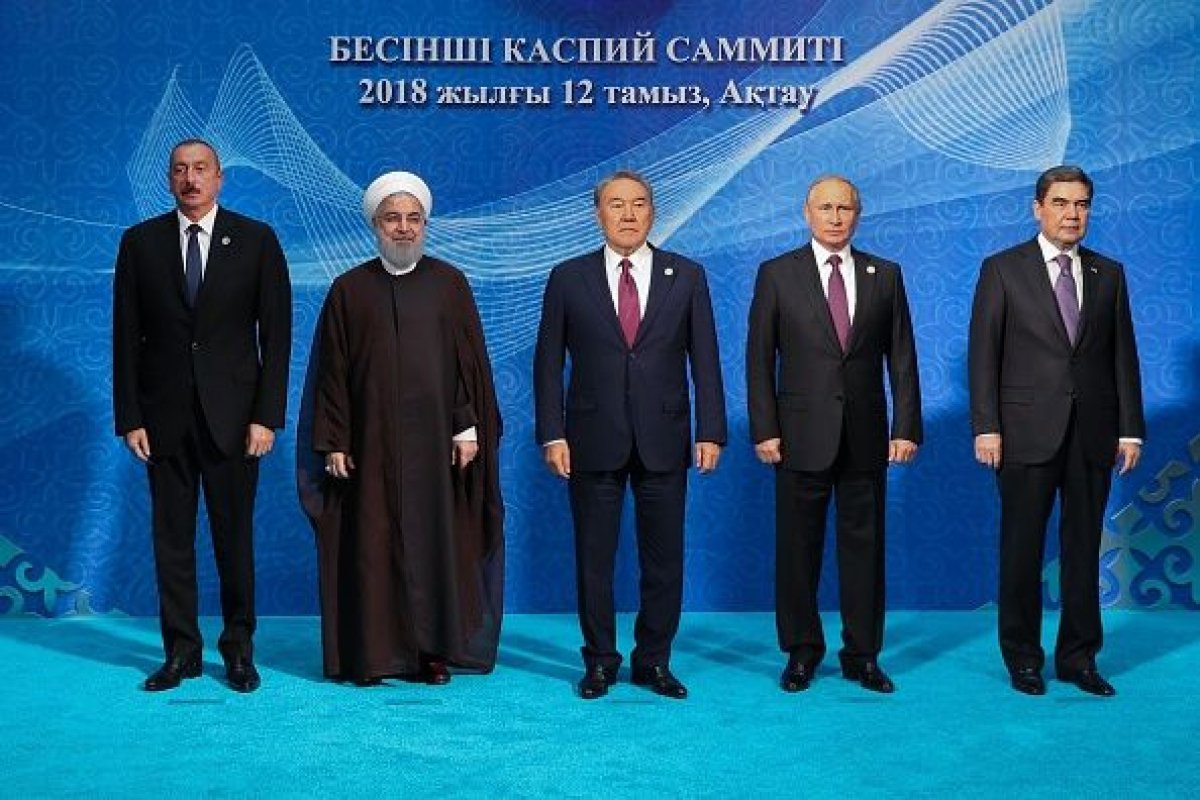Russia, Iran, and a handful of other countries made a diplomatic breakthrough on Sunday to solve a dispute that has dragged on for decades.
Leaders from five countries—Russia, Iran, Azerbaijan, Kazakhstan and Turkmenistan—officially signed an agreement to determine the fate of the Caspian Sea, the world's largest body of inland water that's been in dispute since the fall of the Soviet Union in 1991.
Until 1991, the maritime area was shared between the Soviet Union and Iran. But when the superpower split into 15 separate countries, questions emerged over who should control the Caspian Sea's resources, and whether it is actually a sea or a lake.
During the Soviet era the Caspian Sea was considered a lake. After the fall of the Soviet Union, however, the successor countries changed their tune and began calling it a sea. Only Iran argued that it was a lake, and consequently that it could not be ruled the United Nations Law of the Sea.

Ultimately, the new agreement signed Sunday was a compromise. It gave the Caspian Sea "special legal status," making it neither a sea nor a lake. All five countries will be permitted to patrol the body of water, and the natural resources found on the bottom of the Caspian Sea—vast reserves of oil and natural gas—will be divided between all five countries.
#Russia, #Iran, #Kazakhstan, #Turkmenistan, & #Azerbaijan signed an agreement on Sunday to define the #Caspian Sea’s legal status — paving way for more #energy exploration in the region & possibly a Trans-Caspian Gas Pipeline from Turkmenistan to #Europe. https://t.co/MzfgEgwT5I pic.twitter.com/udhGQrbOB3
— For What It's Worth (@FWIWmacro) August 12, 2018
"The agreement fixes the exclusive right and responsibility of our states for the fate of the Caspian Sea and establishes clear rules for its collective use," Russian President Vladimir Putin affirmed after the agreement was signed.
The murky legal status of the Caspian Sea had derailed several regional pipeline projects that had aimed to bring energy supplies from Central Asia into Europe. The body of water is estimated to hold around 48 billion barrels of oil and 8.7 trillion cubic meters of natural gas. Under the new agreement, new pipelines can be constructed whenever all five countries agree to it. For many observers, Sunday's agreement was a diplomatic breakthrough that could lead to more investment and perhaps even lower energy prices.
But some social media users from Iran lashed out against the deal and accused their President Hassan Rouhani of having sold them out. That is likely because Iran has the smallest amount of Caspian Sea coastline of all five countries.
Islamic Dictators sold out Iran's Share of Caspian Sea to #Putin!
— Khosro Fravahar (@KFravahar) August 13, 2018
Iran had a 50% share of Caspian Sea from 1921 and 1940 Agreements with Soviet Union! Yesterday those islamic animals ruling my country gave all that away! Now We own only 13% of Caspian Sea! #CaspianSeaSoldOut
The final text of the agreement, formally called the Convention on the Legal Status of the Caspian Sea, has not yet been officially released.
Uncommon Knowledge
Newsweek is committed to challenging conventional wisdom and finding connections in the search for common ground.
Newsweek is committed to challenging conventional wisdom and finding connections in the search for common ground.
About the writer
Cristina Maza is an award-winning journalist who has reported from countries such as Cambodia, Kyrgyzstan, India, Lithuania, Serbia, and Turkey. ... Read more
To read how Newsweek uses AI as a newsroom tool, Click here.








